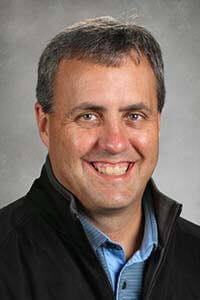February 7, 2022
 How many years have you been at MPA?
How many years have you been at MPA?
I am in year 19 at MPA.
What do you love about MPA?
The thing that I love most about MPA is that it is first and foremost a community of engaged and caring people. Families, students, and staff are all part of the fabric that makes this place special and I believe that people feel valued for being themselves.
How does MPA inspire students who dream big and do right?
As the person that builds the master schedule for the Upper School, I feel like the intentionality of choices is an integral part of the MPA system. Students can take a lot of different things in their career and the experiences that they have are part of what makes them who they are. I see opportunities to get involved way beyond the classroom by participating in athletics, productions, clubs, or service. When students can engage, then those choices inform the development of the whole person and not just focus on some specialization in one area to the detriment of other interests.
If you have worked at another school, how has your experience at MPA been different?
I have been in education for over 30 years and most of those have been spent at the high school level. The differences are vast in terms of what students are supported in doing at MPA. An example from a past job experience is that in other settings there was often a tolerance of students and not an appreciation for them as people. As a college preparatory school, MPA has rigor and challenge and process, but it also has a humanity and an intentionality for the purpose of developing relationships. There is also exceptional guidance on college and life choices from adults whom students trust in their school.
What would you tell a parent considering MPA?
Always look to the faculty as they are the backbone of every school. I refer to MPA teachers as “warm-demanders,” as they challenge their students to be the best they can be. The culture of MPA is to provide rigor with purpose and I believe that best examples of this approach are the students themselves. For parents considering their school choice, look to the faculty and staff for evidence of the culture of the place and listen to the students about their experiences.
In what ways are you preparing students for life in the 21st century?
I believe that the best possible preparation student can have for life in the 21st century is to foster their curiosity and mentor them in effective communication. Many students in school in the year 2022 may be working in jobs that have not even been created yet, so it is essential to know how to think critically in a world that can overwhelm the senses. Also, the ability to communicate clearly in all forms is the difference maker for skill development and preparation. MPA students get to practice the skill of communicating in every discipline area and at all grade levels with teachers and staff that care about them as people.
What do you hope for MPA students in 20 years?
My hope is that MPA will continue to remain committed to the core values that have been a part of the school since the beginning. In some ways, MPA is something of an island of clarity in a larger turbulent sea and it is my hope that people connected with the school will always place a high value on the mission of the school.
Is there anything else you’d like to share about your MPA experience?
MPA is a special place because of the people that are part of, or have been a part of, this community. There is a generosity of spirit that so many bring to the school every day and it is just not like any other place that I have worked in my career.